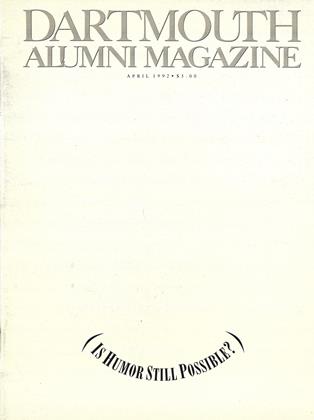"Don't make this bio too serious.."
TAKING A LEAF from the uncanny literature she has loved since early childhood, German Professor Ulrike Rainer turned the writer E.T.A. Hoffmann into a dog. Well, more precisely, she named her pet terrier "ETAH" in initialized homage to the author of The Nutcracker and other fantastic stories. Rainer is one professor who loves the far side of literature. She lights right up when she tells of how her colleagues call ETAH's posterior the tail of Hoffmann.
"Don't make this bio too serious," Rainer told the magazine in a comment that was as much a revelation as a plea. It's not that she takes her professorial role lightly; rather, she seems to think that things academic are fun. In ex- plaining, for example, why she is drawn to eighteenth-century prose, she says, "I like the Age of Reason because it was about idealism. What was wrong with it that it couldn't sustain itself? It assumed that if all people are educated and rational, all will be well. The problem is that the devil-may-care attitude interferes."
Shining through her studies of Schiller and the eclectic range of language, literature, and film studies courses Rainer teaches, is her own brand of devilmaycare, which seems to hold a special appeal for students. She says that film studies students often approach her to play elderly women in their films. Bemused rather than offended at this type-casting, she obligingly plays mothers and grandmothers in their films and sometimes on the stage. On the other side of the camera, Rainer teaches a course on the films of Ingmar Bergman and is preparing a new course on post- World War II European women writers and their films.
Meanwhile Rainer, who came to Dartmouth in 1985 after earning a doctorate in German literature at Harvard, offers a freshman seminar on fantastic tales. "I like to teach the uncanny to freshman because this kind of story makes you question assumptions about reality. Students resist challenges to their assumptions," she says, antidote at the ready. "Kafka lends itself to this." So, cannily enough, does Rainer.
 View Full Issue
View Full Issue
More From This Issue
-
 Cover Story
Cover StoryIS HUMOR STILL POSSIBLE?
April 1992 By ROBERT SULLIVAN '75 -
 Feature
FeatureTo Dream With Open Eyes
April 1992 By flagg Miller '91 -
 Feature
FeatureThe River
April 1992 By W. D. Wetherell -
 Feature
FeatureJoy Kenseth's Wonder Room
April 1992 By Karen Endicott -
 Feature
FeatureAn Award In Honor Of The Risk Taker
April 1992 -
 Article
ArticleThe Imagination Unbound
April 1992 By Ulrike Rainer
Karen Endicott
-
 Article
ArticleA Professor's Delights
MAY • 1988 By Karen Endicott -
 Feature
FeatureTaking God's Word For It
APRIL 1990 By Karen Endicott -
 Article
ArticleReligion Professor Ronald Green:
December 1992 By Karen Endicott -
 History
HistoryCarnival Atmosphere
Jan/Feb 2001 By Karen Endicott -
 CLASSROOM
CLASSROOMThe Answers Are Blowin’ in the Wind
Jan/Feb 2001 By Karen Endicott -
 Article
ArticleCONFRONTING CHEMOPHOBIA
December 1991 By Professor Gordon W. Gribble, Karen Endicott







